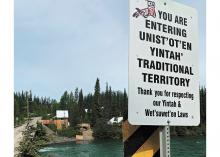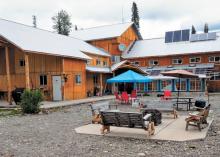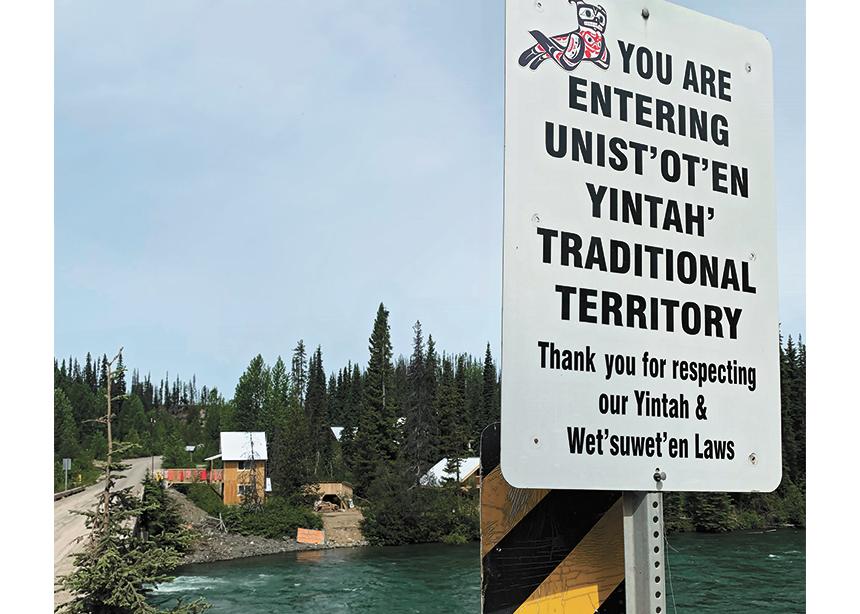Allegra Friesen Epp is wrapping up a six-month internship with Mennonite Church Canada and Christian Peacemaker Teams (CPT), but she is already brainstorming ways to continue doing solidarity work.
The internship is the first of its kind, created by MC Canada’s Indigenous-Settler Relations (ISR) office and CPT’s Turtle Island Solidarity Network. From February to July, Friesen Epp immersed herself in peacemaking and solidarity work. She connected with local and national groups organizing around environmental and decolonization issues. She helped plan a rally to protest a legislative bill that she says endangers people’s rights to peaceful protest. She walked with Mama Bear Clan, an Indigenous-led community street patrol in Winnipeg’s inner city.
Friesen Epp attends Home Street Mennonite Church in Winnipeg and graduated from Canadian Mennonite University there in 2020. She did her practicum in MC Canada’s ISR office, helping coordinate a two-week walk through Alberta to raise awareness about treaties and a rally in support of Bill C-262, a piece of Indigenous rights legislation.
“I care deeply about justice and the dignity of all peoples, and one of the fundamental injustices in this country that we now call Canada is the treatment of Indigenous peoples,” she says.
It’s an issue Home Street Mennonite has explored over the years, and she hopes other congregations will do the same. To help with this, she created and compiled prayers, sermon ideas, songs, artwork and stories that churches can use to take action towards reconciliation in their communities.
She says that her time at the Unist’ot’en camp was the most impactful experience of her internship. The camp has been a place of Indigenous “resistance and resurgence” on unceded Wet’suwet’en territory in northern British Columbia for over 12 years. Friesen Epp and four others formed a joint CPT-MC Canada accompaniment team that spent a month at the camp this June, at the invitation of the land defenders there.
As guests on the territory, team members listened, learned and helped out in whatever ways possible. They built tiny houses, chopped firewood, cooked meals, washed dishes, and shared food and stories.
It’s a beautiful place, she says, adding that there is so much more going on there than just pipeline resistance, which was well documented in the media in 2020, including Canadian Mennonite. A central feature of the camp is the healing centre, which provides cultural teachings, runs youth camps and reconnects people with the land.
Life at the camp is a decades-long effort to rectify land-rights violations and protect a whole way of life inseparable from creation, she says.
“A major learning for me was realizing that if we, as a church, can be present in these places, we would learn so much about what it means to care for creation,” she says. “It became really apparent to me that the frontline struggles are the places to be right now. As we reach unprecedented heat waves, and as climate change increases, and as the call for land back and Indigenous sovereignty is stronger than ever, the frontlines are where history is being made.”
Friesen Epp says that the MC Canada and CPT partnership is exciting because both organizations can learn from each other: the church from CPT’s frontline work and CPT from the church’s strong faith focus. She hopes more people will consider getting involved with opportunities like these.
“Allegra is an incredible young leader, with so many gifts and passions to add to the work of the circle,” says Steve Heinrichs, director of Indigenous-Settler Relations for MC Canada, co-chair of CPT’s steering committee, and a member of the accompaniment team. “And there are others like Allegra in our constituency, who care deeply about reconciliation, decolonization and climate justice. Internships like this create space, not only for Allegra to grow in faith and hone her skill, but to help me and the institution do the same.
“When we link arms, we are not only stronger together, but we’re often more creative and courageous,” he says. “I’m praying that we can do this again!”
Watch a recent sermon Allegra Friesen Epp preached:
Do you have a story idea about Mennonites in Manitoba? Send it to Nicolien Klassen-Wiebe at mb@canadianmennonite.org.

The CPT-MC Canada accompaniment team spent a month at Unist'ot'en camp in unceded Wet'suwet'en territory in northern B.C., learning from Indigenous land defenders and helping wherever they were needed. (Photo by Steve Heinrichs)

The healing centre at the Unist'ot'en camp provides cultural teaching, runs youth camps and reconnects people with the land. (Photo by Josiah Neufeld)





Comments
The headline states, “The frontlines are where history is being made.” Unfortunately, the efforts of MC Canada and CPT amount to token responses and are not reflective of the values of the constituents of these respective organizations back home. These efforts are often seen as politically sensitive, regarding both the environmental and Indigenous concerns, and are only grudgingly supported. It is not atypical that I hear climate change denial and racism from Mennonite constituents here in the heart of southern Manitoba.
I believe it is time for MC Canada to change up a long-standing and failing strategy, that of sending emissaries to some supposed frontline of contention to try to right some kind of injustice. This kind of “action” takes the focus away from where the action really needs to be, namely the hearts of Mennonite constituents. Whether it is mission work to some far flung country, or whether it is on the frontlines with the Unist’ot’en people, we seem to have a “white saviour” complex whereby we apply some meagre resources and attention to concerns abroad or afield, often with some proselytization thrown into the mix, in order it seems to salve our consciences at home, and definitely to ignore the problems at home, the problems of our own wealth, greed, and prejudices.
The environmental and colonization problems of the Unist'ot'en are not Indigenous in origin, they have Christian Anabaptist Mennonite roots. The source of these problems is found in the lives of Mennonite constituents here in southern Manitoba. We have taken the land from Indigenous folks (Mennonite Reserves in Treaty 1 territory 1874) and have wrought environmental devastation upon the land with our extraction methods of agriculture and industry as we build empire and wealth. It seems to me that the MC Canada response is a typical avoidance response, send some emissaries to help Indigenous peoples deal with problems we have created, and then take credit for our efforts. This response may be salve for a guilty conscience however one would think it would not adequately appease a God of justice.
Anabaptist/Mennonites originated out of the 16th century Protestant Reformation in opposition to the dominant Roman Catholic Church rule at the time, yet it seems we have never strayed far from the mandates of the Doctrine of Discovery issued by pope Alexander VI just prior to the Reformation and coincidental to the European Age of Discovery and empire. Pope Alexander VI issued two papal bulls, Romanus Pontifex in 1455 and Inter Caetera in 1493. The most powerful representative of Christianity in the world at the time, gave his blessing to “invade, search out, capture, vanquish, and subdue all Saracens and pagans whatsoever and reduce their persons to perpetual slavery, … and any land not inhabited by Christians was available to be “discovered,” claimed, and exploited by Christians … and that the Christian religion be exalted … and barbarous nations be overthrown.” The DoD was a Christian sanctioned genocide to eradicate the Indigenous peoples of the Americas and the world at large.
Anabaptist Mennonites have followed these mandates religiously throughout our time here in North America, ever since the reports of “Menists in Manhatten” by 1643 and Pennsylvania Dutch in Germantown, Pennsylvania by 1682. We have blithely gone about our business of following the injunctions of the Doctrines of Discovery as if it truly was the will of God revealed. The frightening thing about all of it is that we don’t question our own actions, we believe that our actions which mirror the DoD are God’s will, that we are acting with God’s blessing.
Unfortunately, history is indeed being made however it is a familiar narrative of colonization, genocide, and environmental extraction, empire building tempered with emissaries to frontlines in deflection, as we refuse to hold ourselves accountable to the justice demanded by Yahweh. MC Canada emissaries need to be sent to new frontlines, namely the hearts and souls of Mennonite church constituents in the pews on any given Sunday morning.
Hello Peter,
I read your comment with great interest! I agree that work has to be done within our churches to dismantle the structures of settler colonialism, which are indeed rooted in white supremacy and environmental destruction. What I hear you suggesting is that all frontline work is a token gesture and real work is confronting these structures in our communities. I want to push back and say, it needs to be both.
As Allegra's supervisor through Christian Peacemaker Teams, I want to say that Allegra's internship has been pivotal in bridging this work: frontline solidarity and speaking to our churches. As mentioned in the article, this internship has put Allegra on the frontlines of Indigenous Solidarity while educating and networking within Mennonite communities to undo settler colonialism. Have you watched the sermon? It's a fabulous example of this work.
Another example of this work is the Faith Action Toolkit Allegra put together in solidarity with 1492 Land Back Lane: https://cptaction.org/wp-content/uploads/2021/05/1492-Land-Back-Toolkit.pdf
Another key aspect of this internship was for Allegra to organize trainings in constituent churches on dismantling settler colonialism, nonviolent direct action and anti-racism. Unfortunately, the pandemic had to put in-person trainings on hold. That said, we are ready to jump in and start them again.
Peter, let's work together on dismantling settler colonialism in our churches. Perhaps you would like to organize a training or presentation in the coming months so we can get this work done. Feel free to reach out to canada@cpt.org and we can make this work possible.
Hello Rachelle Friesen,
It is refreshing to hear from you that “work has to be done in our churches.” On this I think we can agree. I guess we would disagree as to whether that is currently happening to an appreciable extent. I too recognize that education needs to be done, however as I have earlier indicated, I don’t believe that sending emissaries to conflicts and then having them report back to the churches is an effective way of educating Mennonite congregations, especially when these very congregations are, to my mind, the root of the conflicts we send our emissaries to observe/mediate.
It is not that I see the “frontlines” efforts as a token gesture, rather it is that I think CPT and MC Canada have misidentified where the frontlines are, namely not with the Unist’ot’en/Coastal GasLinks dispute but rather within the congregations and constituents of the MC Canada. Perhaps our efforts do need to include identifying with the Unist’ot’en cause as well as educating our congregations at home, however I think this is a bit of a red herring. It is always easier for organizations to “fight the good fight” abroad than to challenge our own injustices at home.
The history of Christian Peacemaker Teams is a strong example of “fighting the good fight” abroad with the blessings of the constituents at home, which becomes an act of deflection. Since Ron Sider’s 1984 Mennonite World Conference vision of peacemaker teams and the subsequent first Canadian Resources Board meeting in 1988 (held in Altona, Manitoba), Christian Peacemaker Teams have been sent to Labrador (military flights over Innu lands), North Dakota (nuclear missile silos), Oka, Quebec (human rights), Iraq (Gulf War), Haiti (human rights), Washington, D.C. (urban violence), Palestine (Israeli settler incursions), Chechnya/Bosnia (human rights), Chiapas, Mexico (paramilitary violence), Colombia (FARC), Mi’kmaw fishers (lobster), Turtle Island Solidarity Network (Landback Lane, Unist’ot’en), and Aegean Sea (migrant solidarity).
Perhaps I have missed a few CPT efforts over the years, however I came across no CPT efforts to send emissaries for weeks, months, or years at a time to MC Canada communities to educate congregations in the 3 R’s in respect to our unjust actions towards Indigenous peoples in Canada, namely Repent, Reconcile, and Reparation. Invariably, CPT’s actions have been to send emissaries abroad or far-a-field and have them report back to the churches. I believe that this strategy provides a screen which deflects the onus from MC Canada constituents and places the action in a similar context as “mission work” which constituents then more readily deem acceptable, and so we pat ourselves on the back for how we as “David stood up to Goliath,” in attempt to solve a problem which we ourselves have contributed to in the making.
Perhaps CPT and MC Canada are not aware of the serious past and on-going impacts of Christian Anabaptist Mennonite colonialism on the Indigenous peoples of Turtle Island, and therefore feel that CP Teams placed in Anabaptist Mennonite communities are unnecessary. Perhaps CPT believes that establishing CP Teams placed in Mennonite communities would be a lost cause, that nothing could be accomplished. More likely though, concerted efforts to call Mennonite churches to repent require an expenditure of political capital and goodwill which MC Canada and CPT are unwilling to make.
A cursory history of the impacts of colonialism (which Mennonites have deeply committed to) include:
• the Papal Bulls of Alexander VI in 1455 and 1493 which allowed for the taking of the land and the genocide of non-Christian Indigenous peoples, Papal Bulls which Mennonites obeyed whether they consciously thought of them or not.
• the genocidal destructive aspects of colonialism include the loss of land, language, spirituality, family structures, social and governmental structures, systemic racism, personal racism, Treaties broken, the Indian Act of 1876, residential schools, sixties scoop, millennial scoop, MMIWG, over representation of Indigenous folks in penitentiaries, negative stereotypes, housing issues, boil water advisories, health care racism, birth alerts, etc.
The list is long, yet we are hesitant to sent out emissaries to the perpetrators of such violence, violence which we still contribute to.
MC Canada has created an Indigenous-Settler Relations arm as part of its overall program for “interested congregations.” MC Canada has tried to encourage support for the passing of Bill 262 in Canadian parliament, the “UNDRIP” bill which declares the rights of Indigenous peoples world-wide. Indigenous-Settler Relations has a component called “The Jubilee Fund” based on the Leviticus Biblical injunction to return the land to its rightful owners every 50 years or so. All of these are all laudable efforts, however like the CP Teams absent from the Mennonite communities, so too MC Canada with its Indigenous-Settler Relations program has been reticent in putting the onus and focus of its efforts squarely upon/within Mennonite communities. The mark has been missed to this point.
Beyond the above reasons for some kind of introspective justice of Mennonite communities to the problems we have created for Indigenous peoples of Turtle Island, Allegra Friesen Epp (CPT) with her allegory comparing the I Kings 21 Biblical account of King Ahab committing murder to steal Naboth’s land, clearly calls Mennonites to account to act justly, for what is quite likely the most important reason of all, namely that the God we claim to believe in, Yahweh, is a God of justice.
Our God demands that we act justly. Allegra Friesen Epp identifies “one of the fundamental injustices of this country we now call Canada is the (mis)treatment of Indigenous peoples.” We, like King Ahab, have used the powers of the monarchy to steal land, the vineyard of Turtle Island. We have benefitted from the privileges accrued from this theft. As a matter of fact, Mennonites came to Manitoba, Canada with Treaty making in mind, namely the list of privileges negotiated with the Canadian government by our delegates; free land (650,000 acres), freedom to worship, freedom of language, military exemption, etc. Our actions contributed to the deprivation of these very freedoms enjoyed by the Indigenous peoples we displaced.
Yahweh dealt harshly with King Ahab, his family was ruined, his son was killed, and his wife Jezebel’s corpse was fed to the dogs. This seems harsh punishment for unjust actions, however in a cursory reading of the scripture, I do not find that King Ahab returned the land to the family of Naboth. This sounds eerily similar to the Mennonite narrative in Canada thus far, we still have the land.
The mission statement of the CPT organization calls for “building partnerships to transform violence and oppression,” and CPT values include to “transform the structures of domination and oppression.” These are laudable values to live by, and I think are best lived by “at home,” here where the oppression of Indigenous peoples runs deep, is systemic, where oppression is an accepted part of the Anabaptist Mennonite historical narrative, a narrative in which we see ourselves in the role of a faithful people of God. Unless we repent, unless we seek to reconcile and repair, the narrative will not change. We need to begin the journey of repentance if we believe our God is a just God.
To my mind, CPT and MC Canada could contribute in a more focused way by being a stronger presence in Mennonite communities and congregations. This is not a requisite of some kind of social activism effort, rather repentance and justice are requisites of our God. This is what we claim to believe in; our Christianity is on trial.
Dear Peter,
I can say a hearty 'amen' to most of what you are saying. As a matter of historical record on the specifics of CPT accompaniment, I can offer some additional facts.
In 2008, CPT established a permanent Aboriginal Justice Team to bridge the gap between 'home' and 'away'. This team inherited the portfolios of many projects, both past and ongoing, of which the best known is Grassy Narrows First Nation, and includes some of those from your list and various others I mostly know about anecdotally.
(For a while there were more details on the CPT website but after some thought we elected to remove those that were historical efforts rather than ongoing work).
As I say, the intention was to move away from short term accompaniment at 'flashpoints' - what we might call 'front-line' work, and towards a more holistic work of 'Undoing Colonialism' (which might be termed 'Decolonization'), within Settler society, particularly within churches.
I came from overseas to work with this team in 2010, along with others from other countries, and working with people born in Canada who felt much as you do, that this is a problem that must be addressed within Settler churches and institutions. This was my full-time occupation for six years, at which point I took a job with another Canadian ecumenical organization to continue the work in other forms, something I hope I continue to stay truthful to, even as I become more rooted in this country.
Along with direct accompaniment of half a dozen different land- and water- defence projects over the years, we did countless presentations, sermons, and workshops in churches, schools, and institutions. We were able to be present at most of the Truth and Reconciliation national events, and assisted in hosting a regional one in Toronto (in which we also did a memorable presentation making the connection between the Residential Schools and ongoing land theft). And we brought many groups to learn from Indigenous land defenders, hear the invitation towards decolonization, and then worked with people to design a plan to return to their communities (sacred and secular alike) to mobilize on these issues.
CPT formally dissolved its Indigenous Peoples Solidarity Team (having renamed it several years earlier) back around 2018. I wasn't part of it at that time so I won't say much more than that. I will say that the conversation within churches as well as society in general at the end of that 10 years was a lot different than at the beginning. The Turtle Island Solidarity Network inherits that particular history of work, acknowledging that many many efforts are ongoing, and are needed, in all sectors of society.
I meant to mention - CPT's Indigenous Solidarity work is best known regarding support for the Grassy Narrows mobilization against clearcut logging without community consent (and the longer term issues of mercury contamination). This is the issue we have tended to use as the focus of our short-term Peacemaker Delegations, to help participants from around the world learn about colonialism and work out what solidarity and resistance looks like in their contexts.
For several years after the end of the 'flashpoint' of the logging blockade (although the issue still persists, year after year, unresolved by the Provincial Government), CPT was invited to do anti-racism and undoing colonialism work in the town of Kenora ON, and staffed a team accordingly, working with community organizations and churches to explore the deeper issues. This was very much what you are talking about, and if the archives of that time are ever made available I think it would make some interesting reading.
I say all this not to claim that the work has been done. Clearly it has just been scratching the surface of what is needed. But I am in my 12th year of having been sent by CPT to the church in Canada, specifically the Mennonite church, to do this work. I'm not with CPT any more, but I consider this to be the work of my life. The fields are ready, but the labourers are few. Pray to the Lord of the harvest to send more workers.
Thank you Mr. Haresnape for your comments and for your past work with CPT and your on-going efforts towards justice in our society. It of course was not my intention to denigrate CPT or Mennonite Church Canada for that matter. My contention is that both organizations had and have a focus on what you identify as "flash-points." This has been and continues to be my observation of MC Canada as well as CPT. Perhaps as you say, over time, there has been a shift by CPT from flash-points initiatives to an "undoing of colonialism in settler society" even in Mennonite church communities, bringing the "on-going land theft" issues to the attention of the Mennonite church community. You provide an example of CPT's Indigenous Solidarity work at Grassy Narrows in regards to clear-cut logging, and efforts to combat racism in the community of Kenora, Ontario. This still seems like a flash-point initiative to me.
I get the sense from your response that CPT has tried to bring the matters of the injustices First Nations peoples have suffered and continue to suffer at the hands of white settler colonialism, closer to home, to the Mennonite church community. I appreciate that you raise the issue of "on-going land theft" and would like bring to your attention (likely you know of this) that the Mennonite Church and its constituents at large in Southern Manitoba were the beneficiaries of at least 500,000 acres of Treaty 1 land post 1874. The Mennonite constituency was the direct beneficiary of the Doctrine of Discovery underlying the Canadian government policies at the time and at present. If this does not constitute "on-going" land theft for CPT or Mennonite Church Canada then that is very disappointing. If this does not constitute a "flash-point" of injustice, then would seem to be due to a willingness of both CPT and Mennonite Church Canada to look the other way and ignore that Yahweh is a god of justice.
I am glad to hear that you are continuing your work in pursuit of justice even when you are no longer involved with CPT. Perhaps then your efforts will in time take you to Southern Manitoba and into the sanctuaries of Mennonite Church Canada where injustice is hiding in plain sight. Once again, thank you for your work with CPT.
Add new comment
Canadian Mennonite invites comments and encourages constructive discussion about our content. Actual full names (first and last) are required. Comments are moderated and may be edited. They will not appear online until approved and will be posted during business hours. Some comments may be reproduced in print.